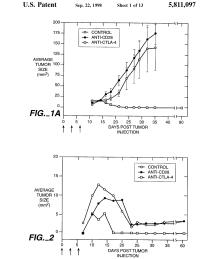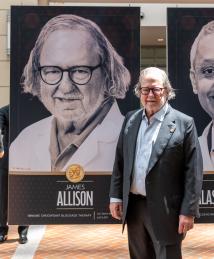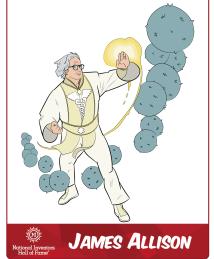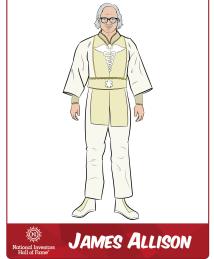James Allison
"I knew that should the opportunity ever arise, I would do all that I could to apply my work to curing cancer."
James Allison invented immune checkpoint blockade therapy. His pioneering work brought immunotherapy into mainstream medicine as an effective treatment for cancer.
Allison was born in Alice, Texas, in 1948. His sense of curiosity was sparked through reading, engaging in hands-on science experiments, and even accompanying his father, a family doctor, on house calls. In an interview with the National Inventors Hall of Fame®, he described his sense of awe when he first used a microscope as a child. “There's life everywhere,” he said. “No matter where you look, it's a fascinating world.”
At The University of Texas at Austin, Allison earned a bachelor’s degree in microbiology in 1969 and a doctorate in biological sciences in 1973. He completed his postdoctoral research in the department of immunology at Scripps Clinic and Research Foundation.
The possibility of developing better ways to treat cancer had been in the back of Allison’s mind since his youth. When he was 11 years old, his mother died of lymphoma. He later lost one uncle to melanoma, and another to lung cancer. “I knew that should the opportunity ever arise, I would do all that I could to apply my work to curing cancer,” he said.
In the field of cancer immunotherapy, researchers had primarily focused on how to activate T cells, which attack invading cells like bacteria and viruses. Allison was interested in understanding T cell biology, and in the late 1970s and early 1980s, while at The University of Texas MD Anderson Cancer Center, he contributed to advances in identifying the T cell receptor (TCR) and cloning TCR genes.
In 1985, Allison joined the faculty of the University of California, Berkeley, where he became director of the Cancer Research Laboratory. In 2004, he joined the Memorial Sloan-Kettering Cancer Center in New York City, where he helped found and served as director of the Ludwig Center for Cancer Immunotherapy until 2012.
“What I ultimately wanted to do was figure out how the immune system worked, and then see if I could get it to kill cancer cells without harming normal cells,” Allison said. To this end, he showed that CTLA-4, a protein on the surface of T cells, works as a “brake,” or an immune system checkpoint that helps the body prevent overreaction in immune responses. In order to free T cells to effectively attack cancer cells, he developed an antibody to block the braking capability of CTLA-4.
Allison applied his revolutionary laboratory findings to develop ipilimumab — the first in a class of drugs known as checkpoint inhibitors. In 2011, ipilimumab was approved by the Food and Drug Administration to treat late-stage melanoma. Released commercially as Yervoy®, it has produced unprecedented results.
In 2018, Allison was awarded the Nobel Prize in Physiology or Medicine. He holds 12 U.S. patents and serves as director of the James P. Allison Institute at MD Anderson in Houston.
In addition to working to improve and prolong life for cancer patients, Allison maintains a deep appreciation for endeavors that enrich life. His love of music has led him to play the harmonica for The Checkpoints, a blues band made up of immunologists and oncologists.
When asked what continues to motivate him, Allison responded, “The ability to understand something complex, and then to share it. That’s a big part of science — sharing it.”



